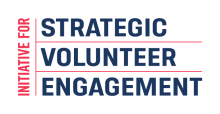
Initiative for Strategic Volunteer Engagement Releases Research—Together with the Do Good Institute—to Revolutionize Strategic Volunteerism in the Nonprofit Sector
As nonprofit organizations continue to face an increase in demand, limited resources and reduced staffing capacity in the wake of a global pandemic, new research finds that volunteer engagement has become more–not less–important to advance their work, but volunteers are now harder to engage. The Initiative for Strategic Volunteer Engagement, together with The Do Good Institute, today released new insights from more than 1,000 nonprofit CEOs and 100+ funders about the state of U.S. volunteer engagement.
The first-of-its-kind quantitative study on strategic volunteerism, “The State of Volunteer Engagement: Insights from Nonprofit Leaders and Funders'' was conducted by Nathan Dietz and Robert T. Grimm, Jr. from the Do Good Institute at the University of Maryland School of Public Policy. This research study is being released in tandem with a new study on funding volunteerism, “Investing in Strategic Volunteer Engagement: A Qualitative Study”, which was led by Sue Carter Kahl of Sue Carter Kahl Consulting.
The release of these new reports is timed with the official launch of the Initiative for Strategic Volunteer Engagement, a new effort of funders and nonprofits who believe in the power of volunteers to expand impact and maximize mission accomplishment. Together, the group will provide practical and research-informed tools and resources to help nonprofits intentionally engage with their volunteer networks and inspire funders to further invest in strategic volunteer engagement.
As COVID-19’s lasting impact on civic life unfolds, the Do Good Institute-led survey found more demand for nonprofit services. In 2022, nearly two-thirds (64.4 percent) of nonprofits reported an increase in demand for their organizational services, with 51.1 percent increasing their delivery of services, and 48.5 percent increasing staff workloads to help meet demand. At the same time, 28.7 percent of nonprofits are operating with less funding and paid staff than they had before the pandemic.
This gap in funding and staffing makes volunteers even more important for many mission-driven organizations. Nonprofits will likely face staff burnout or service delivery issues if this continues. Many of these organizations offer critical services and support to some of the most vulnerable people in our society, so this is something we should all be concerned about.Nathan Dietz Senior Researcher, Do Good Institute
Nonprofits are challenged by finding the right volunteer support as well as the capacity and infrastructure to sustain volunteer engagement. Nearly half (46.8 percent) of CEOs say that recruiting sufficient volunteers is a big problem for their organization, with many saying it's a “big problem” to find volunteers who are available during the traditional workday (38.4 percent) and who have the necessary skills (35.4 percent). Many nonprofits reported they were retaining very few volunteers today, with many sharing that their volunteers were doing less, rather than more, of any specific organizational activity today (such as delivery of services, fundraising, professional assistance or advocacy).
Despite these challenges, nonprofits seem to be more convinced of the benefits of volunteer engagement compared to recent years. For instance, the percentage of nonprofit CEOs who believe “to a great extent” volunteers allow the organization to provide more detailed attention to the people served increased from 37 percent in 2019 to 65.6 percent in 2022. And, the percentage of nonprofit CEOs who believe “to a great extent” volunteers increase the organization’s return on its resource investments increased from 43 percent to 68.4 percent over the same time.
However, there is a gap between funders and nonprofits on both the value and challenges surrounding strategic volunteerism. For example, 72.2 percent of nonprofit leaders felt that volunteers improve the quality of services or programs provided to a great extent, but only 25.2 percent of funders agreed and 65.6 percent of nonprofit leaders report volunteers provide more detailed attention to people served to a great extent, but only 29.3 percent of funders agreed. This lack of shared understanding between funders and nonprofits can be problematic since funder investment is key to helping nonprofits recruit and engage more volunteers.
Unfortunately, volunteers are more scarce in our post-COVID world. While nonprofits are putting more effort behind engaging volunteers today, they are experiencing the triple whammy of greater demand for their services, fewer volunteers, and few funders with a track record of supporting volunteering. These troubling trends must be reversed.Bob Grimm Director, Do Good Institute
The launch of this research coincides with the Initiative’s first webinar where attendees can hear from Kahl and Dietz on key findings and insights from their groundbreaking research; Rina Cohen (UJA-Federation of New York) on how funders can advocate for strategic volunteerism; and the Initiative for Strategic Volunteer Engagement co-directors on the effort to transform the future of the field. The research announcement comes ahead of the release of the Initiative’s Strategic Volunteer Engagement Playbook—a framework for funders and nonprofits to leverage the power of volunteering to advance organizational goals and impact.
We believe in the power of volunteerism to advance mission-critical issues and causes, and that’s the main driving force for commissioning this research. This research will be used to spark a national conversation for greater philanthropic investment in strategic volunteer engagement - and to equip more nonprofits to embrace strategic volunteer engagement for greater impact.Jeffrey Glebocki and Betsy McFarland Co-Directors, Initiative for Strategic Volunteer Engagement
The Institute's report, "The State of Volunteer Engagement" can be found online here. And, the report appendix can be found here.
###
About the Initiative for Strategic Volunteer Engagement: The Initiative for Strategic Volunteer Engagement is transforming the future of volunteerism. Through practical and research-informed tools and resources, we make it easy for nonprofits to intentionally engage their volunteer networks and inspire funders to further invest in strategic volunteer engagement. Funding partners include The Leighty Foundation, The Lodestar Foundation, VolunteerMatch, The National Alliance for Volunteer Engagement, and UJA Federation of New York, with technical assistance provided by Independent Sector. For more information about The Initiative for Strategic Volunteer Engagement, contact info@strategicvolunteerengagement.org.
About the Do Good Institute: The Do Good Institute at the School of Public Policy at the University of Maryland provides hands-on learning experiences, immersive programs and events, research and supportive resources to develop the next generation of nonprofit leaders, social innovators and civic-minded changemakers. Across campus, students engage in hands-on, project-based and research-focused social impact, philanthropy, and leadership courses, giving them needed skills to make a difference, taught by a growing group of respected scholars and accomplished practitioners. The Institute and its faculty engage in civic research to better understand and share the importance of volunteering, giving, and other community-based actions. To learn more visit dogood.umd.edu.




